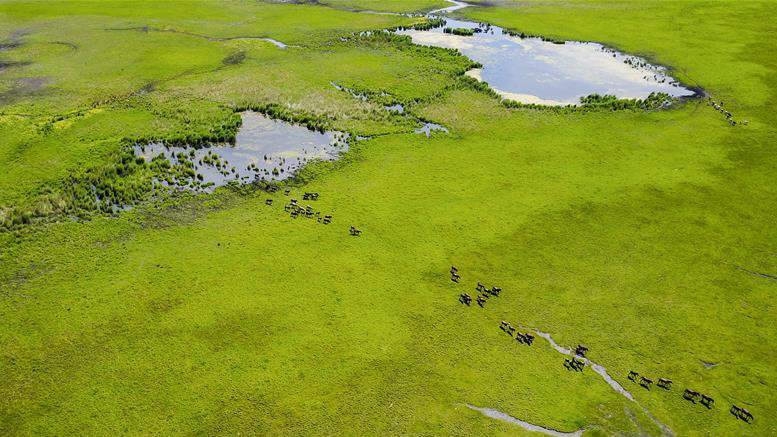
Opinions
17:43, 25-Dec-2017
Year-end Review: Recollections of Green Year 2017– Part 1
Guest commentary by Wu Changhua

China has officially kicked off its national carbon trading scheme this week, right before the end of 2017, as promised to the international community. In a bit of a shock though to many foreign players, rather than focus on two or three industrial sectors, China is concentrating only on the power generation sector for its national carbon market for now. As usual, this will stir quite some noises globally.
Why do I say so? Today’s China has a more significant role and also influence in global environmental governance. Its leadership has been expected. And its decision on such critical issues as carbon trading literally attracts the eyeballs globally. We all know that in order to effectively address the climate challenge, the price of carbon is recognized as a crucial policy instrument to drive actions. I would not be surprised when foreign journalists and colleagues express their doubts about how serious China really is in its drive toward a low carbon transformation. Doubts or not, let’s put them on the side while focusing on what a splendid year China has had in shifting its growth paradigm and embarking on a sustainable pathway.

Swans fly on the surface of the water at Huairou District in Beijing, capital of China, Dec. 23, 2017. /Xinhua Photo
Swans fly on the surface of the water at Huairou District in Beijing, capital of China, Dec. 23, 2017. /Xinhua Photo
I have at least 12 highlights on my list of reflections on China’s greening pathway.The first six will be in part one of this article.
First - Winning the War on Smog
A heavy smog episode hit Beijing and literally kicked off the capital city’s new year of 2017. I remember sitting in the CGTN studio talking live about the why and how. Four years had passed since Premier Li Keqiang declared war on pollution, and yet smog constantly disturbed people’s lives on a regular basis.
Time flies fast. As we approach the end of the year, people in Beijing are more in a celebratory mood for blue skies and clear air. At a winter heating season, when usually smog would be the heaviest, the government takes actions to shift coal to gas, industries advance cleaner production and sometimes with much reduced capacity, and wind definitely helps too. All help to bring a temporary victory toward winning the war on smog. And people would ask for this to become a new normal.

Houses reflect in a small lake at Jinlinwan community where people visit to spend leisure time at Qujing City, southwest China's Yunnan Province, Dec. 24, 2017. /Xinhua Photo
Houses reflect in a small lake at Jinlinwan community where people visit to spend leisure time at Qujing City, southwest China's Yunnan Province, Dec. 24, 2017. /Xinhua Photo
Second - The War on Plastics
The documentary Plastics China won an international award in the Netherlands, more like the “Academy Award” for the best documentaries. This film was shown, on an invitation, on January 19 at the Sundance Film Festival, the day before President Donald Trump’s inauguration. Plastics China attracted a few million viewers within a couple of days after it was posted online.
When I was in the CGTN studio with the producer and director, it was such an inspiring and respectful conversation. The impact was huge. A few months later, the Chinese government announced it would say no to foreign garbage imports, with plastics at the top of the list.
In the meantime, we also noticed that the plastics packaging waste issue had been lifted up and extended very broadly, in particular, to increase consumer awareness and change behavior around e-commerce and express delivery. Companies have also started to take actions. Alibaba joined hands with the Ministry of Environmental Protection to drive R&D for substitute biodegradable materials. This combines well with the global campaign to address plastics in the oceans.
Third - Continued Corporate Sustainability Leadership and Innovation
I sit on the sustainability advisory boards of a few global leading companies, such as Dow Chemicals and P&G in North America, BHP Billiton in Australia, IKEA, DPDHL and Veolia in Europe.
While, I appreciate those opportunities greatly to deep-dive into those sectors to understand the innovation, strategy and barriers to overcome for those companies when driving their sustainability strategies, I have to say that their role models set precedents for more Chinese companies to follow, particularly now in the fast-shifting global context of China leading a new globalization.

The scenery of Jinlinwan community where people visit to spend leisure time at Qujing City, southwest China's Yunnan Province. /Xinhua Photo
The scenery of Jinlinwan community where people visit to spend leisure time at Qujing City, southwest China's Yunnan Province. /Xinhua Photo
Fourth - Green Belt and Road
In May, the OBOR (One Belt, One Road) High-level Forum hosted in Beijing ushered in a new stage when China officially rolled out its OBOR Initiative jointly with global partners. A grand new growth engine created under China’s leadership, OBOR becomes increasingly appreciated by other countries and companies given a grand scale of the new globalization strategy. One of the most impressive developments is that green is now added to define OBOR, which is well aligned with President Xi Jinping’s vision of ecological civilization and China’s contribution and leadership of a new global environmental governance.
In the meantime, digital becomes another definitive word for OBOR, particularly in the context of the EuroAsia Continental partnership. It is believed that a close collaboration between China and Europe in the new technology age will enhance the foundation of a sound biosphere-based sustainable future.

A herd of deer seen on the snowfield in Hexigten Qi of Chifeng City, north China's Inner Mongolia Autonomous Region on Dec. 24, 2017. /Xinhua Photo
A herd of deer seen on the snowfield in Hexigten Qi of Chifeng City, north China's Inner Mongolia Autonomous Region on Dec. 24, 2017. /Xinhua Photo
Fifth - New Era of Climate Change
What a bumpy road for the global process of climate change! President Trump decided to pull the US out of Paris Agreement and insisted on the renegotiation of a climate agreement that has to favor the US. How rude! As the world’s largest economy and second largest emitter, US actions or no actions have much larger repercussions globally. Suddenly the whole world got disturbed and worried about the future of the Paris Agreement, a successful outcome from a long, overdue and difficult negotiation process.
What is encouraging is that other major economies did not shiver. China, the EU, India and many others are firm and steady, with a clear position that Paris is not renegotiable! As simple as that. Such leadership becomes the foundation for global efforts to carry on the global clean revolution and transformation towards a climate-resilient future.
While all the countries that have stayed on deserve the credit, I would give French President Macron a special recognition for his leadership to advance global momentum and actions. The One Planet Summit in December was a highlight of his leadership when the UN Secretary General and World Bank President Jim Yong Kim joined the partnership to advance climate finance.
Sixth - Zhenjiang International Low Carbon Expo
China has taken low carbon transformation seriously, not only to address climate challenges and shoulder its responsibility of the largest emitter, but rather to seize the opportunity to transform its economy, industry, energy and infrastructure by capturing the new technology and industrial revolution. Cities and regions are all on board for action. Zhenjiang of Jiangsu Province, one of the national low carbon city pilots, launched an international partnership Expo when technologies, industries, finance, innovation and entrepreneurship were all gathered to zoom in on solutions for a climate-resilient future.
I had the honor to work with former Mayor Zhu Xiaoming in 2016, and in 2017, I witnessed another successful Expo, which has begun to create a globally recognizable brand for the city in leading low carbon innovation and transformation.
(Wu Changhua is China/Asia director, Office of Jeremy Rifkin; member, Future Agenda Council of Environment and Natural Resources Security, World Economic Forum; vice chair, governing council of Asia-Pacific Water Forum and vice chair, World Green Design Organization. The views expressed in part one of this articles are his own. The article reflects the author’s opinion, not necessarily the views of CGTN.)
For Part 2 please click here: Year-end Review: Recollections of Green Year 2017– Part 2

SITEMAP
Copyright © 2018 CGTN. Beijing ICP prepared NO.16065310-3
Copyright © 2018 CGTN. Beijing ICP prepared NO.16065310-3